
views
- Sit with your back straight and hold your pen or pencil between your thumb, index, and middle finger to practice proper posture.
- Look up a handwriting style you like to use as a reference, and practice copying each letter over and over, until writing them feels natural.
- Keep your grip loose, slant your letters slightly, and add things like loops or other flourishes to give your writing some feminine flair.
Understanding Handwriting

Know why people have different handwriting styles. There are an infinite number of possible handwriting styles, and a large number of factors that determine an individuals handwriting style. This means that everyone's handwriting is unique, which is why it is sometimes used a legitimate method of identification, such as during court trials.
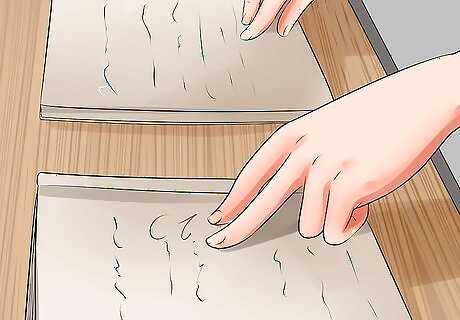
Understand the differences between male and female handwriting. Although there are many theories about the differences between male and female handwriting, it turns out, people aren't actually that good at differentiating between the two. Some generalities can be made, such as women's handwriting being neater on average. Women tend to write slower, and larger, with more attention to detail. One study found that prenatal hormones in women can predict the femininity of their handwriting.

Analyse your handwriting as it is now. Since one of the major differences between male and female handwriting is neatness, you can make your handwriting more girly just by improving your handwriting in general. The first step to improving your handwriting is analyzing how you write now. Take out a sheet of lined paper and a pen. Write the sentence "The quick brown fox jumps over the lazy dog" a couple of times. This sentence contains the whole alphabet. Note the areas that could use improvement. Does your handwriting slant or is it upright? Do you vary the length and height of your letters? Circle the letters you like the look of the least.
Improving Your Handwriting
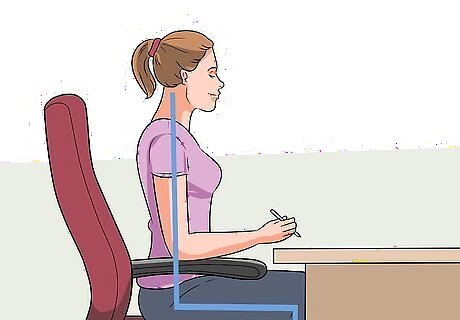
Check your posture. Find a spot to begin practicing. You should have a hard, flat surface to write on, paper, a pen, and a chair. Sit with your back straight. Use your non-dominant hand to balance yourself.
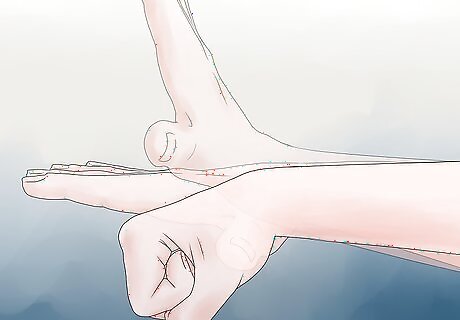
Flex and stretch your hand before beginning. Stretch your arms and hands. Loosen up your wrist and get your hand nice and relaxed before you begin to practice each day.
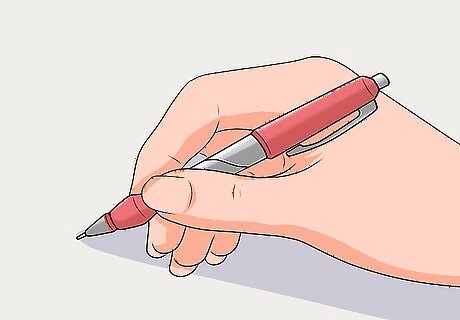
Improve how you hold your pen. The best way to hold the pen is to grip it between your thumb, index finger, and middle finger, with the back resting on your first knuckle.
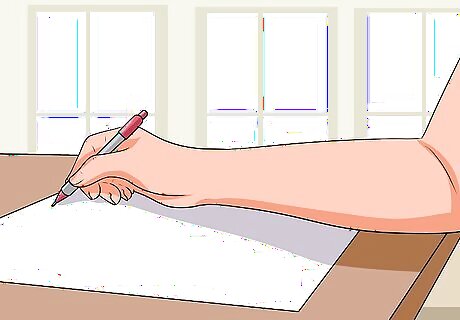
Practice writing with your arm instead of your fingers. Your handwriting will instantly become more relaxed and flowing if you start moving the pen by moving your arm, while keeping your wrist and fingers still. This may make it harder to write carefully at first, but it's a habit that will help you in the long run. When first practicing writing like this, make big letters on the page. Exaggerate the size of your words and slowly bring the size back down as you get used to writing with your arm.
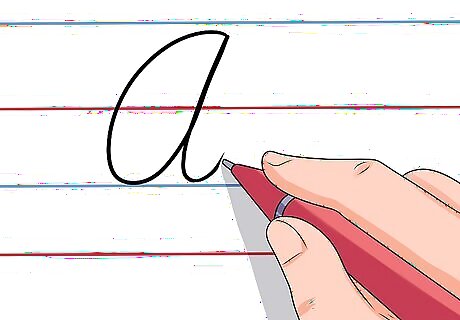
Slow your writing down. Good letter formation takes careful concentration, especially if you aren't used to writing well. This means you need to take your time with each word and each letter. You can start to speed up slowly as you improve.
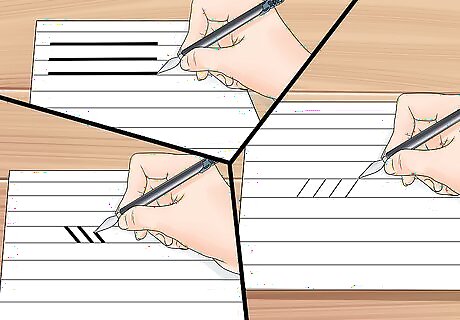
Practice first with lines, and then letters. You should be practicing all of these handwriting techniques every day. Start each day with simple lines and shapes. Make vertical lines over and over, working on keeping the lines straight and the spaces between them even. Do the same with some circles, and slanted lines. Then move on to writing letters over and over, until you consistently like the look of them.
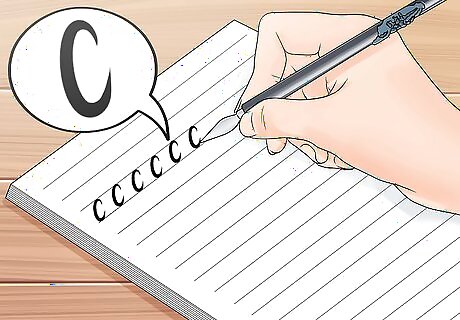
Keep your handwriting consistent. Once you've got a better handle on the shapes you're forming, focus on consistency. Your letters should be sized consistently across the page. This will make your handwriting look neat and orderly. Try to keep the angle of your handwriting consistent too, both the slanting of the letters and the angle at which you draw crossbars on letters like "t" and "f".
Making Your Handwriting Feminine

Look up and copy examples of feminine handwriting. The easiest way to get a head start on making your handwriting more feminine is to copy handwriting that you consider feminine. Find an example of feminine handwriting, print it out, and use tracing paper to trace over the writing. Then try copying the handwriting style from sight, rather than tracing. If you have a female friend or sibling with particularly feminine handwriting, you can ask to borrow an example of theirs. In addition to tracing and copying examples of feminine handwriting, you also spend some time just analyzing what about the handwriting gives it a feminine look.
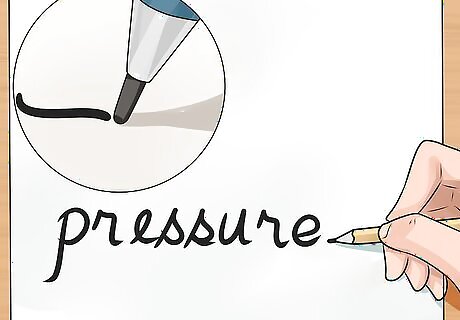
Use less pressure. One generality that separates male from female handwriting is that women tend to use less pressure when writing. Writing with your arm rather than your fingers will do a lot to help this, but it can't hurt to take some extra care to lighten your pressure as you write.
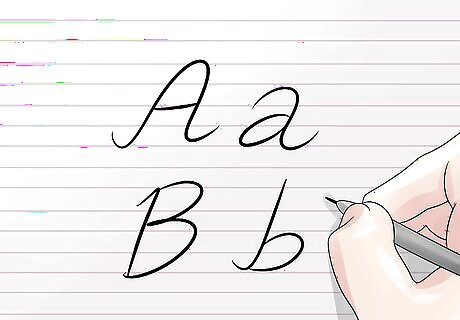
Make your lines more curvy. Feminine handwriting tends to borrow some its characteristics from cursive. So one way to add a more girly flair to your handwriting is to start introduction more curves to your letters. For example: You can write "t"s with little curves at the bottom, rather than just a simple straight line. You can exaggerate the curves in the feet of letters like "a" and "Q". Use flourishes to add feminine detail to your letters. For example, maybe the bottom foot of your lowercase "k"s can flourish upwards at the end. Or maybe your "w"s can start with a small upward curve instead of just going straight downwards.

Add more space. Feminine handwriting tends to have fuller counters, meaning that the space within each letter is fuller. You can also add space in places which normally have none, like making your dots (as you would on the letter 'i') small circles. This is an easy way to add a stereotypically girly flair to your letters.
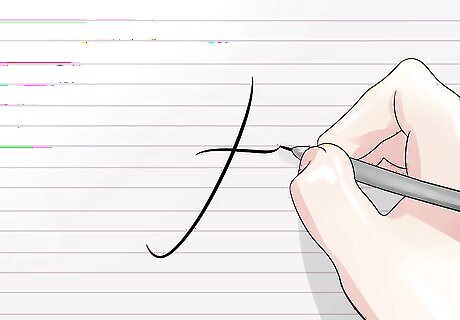
Try slanting your writing. Slanting your letters can add to the cursive quality of your handwriting. Whether you slant your words to the left or the right, just make sure your slant is consistent. This goes along with keeping your handwriting neat and tidy, a characteristic of feminine handwriting.
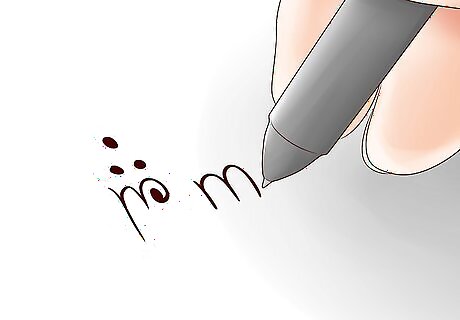
Make up new fonts. If your handwriting is already girly, try experimenting with your own styles. Curve your A's at the top, or dot your lowercase I's with special symbols like stars or hearts. Personalize your writing and make it beautiful!

Use fun pens. Vibrant, glittery colored pens, though not technically part of your "handwriting", can add just the right amount of pop to your girly handwriting. If you write with friends, the outside of the pen can be just as important as the color, so try to pick pens that look pretty and colorful. Make sure to avoid using pens in classes like Math and Science, because these subjects often have strict teachers who only accept work written in pencil. Sometimes these teachers do allow erasable pens, so don't be afraid to ask!




















Comments
0 comment